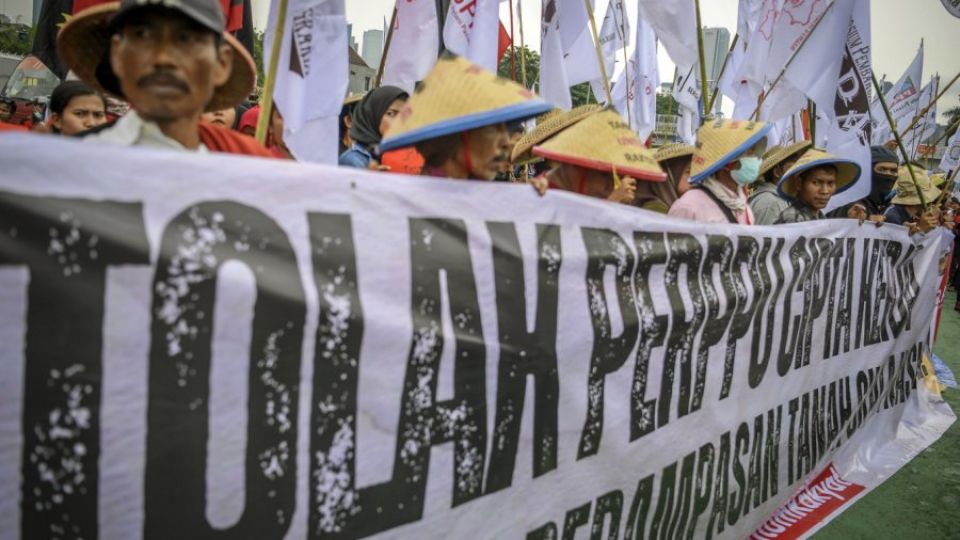March 23, 2023
JAKARTA – Frustration is mounting as a growing number of interest groups reject the passage of a controversial regulation in lieu of law (Perppu) on job creation, arguing that the process has been “constitutionally defective” and “undemocratic” from the outset.
President Joko “Jokowi” Widodo signed in December 2022 the Perppu to resuscitate the Job Creation Law, which was declared “conditionally unconstitutional” by the Constitutional Court in 2021 because it used the unrecognized omnibus method to revise multiple laws at once and was deliberated with minimal public participation.
The top court gave the government and the House of Representatives an ultimatum to redo the lawmaking process within two years or risk it being permanently revoked. Instead, the government issued the Perppu after it cut corners with lawmakers by enacting another law that allows the use of omnibus methods.
The Perppu, which must be passed by a House plenary session to become permanent legislation, had secured wide support from the House Legislative Body (Baleg) in February, with all pro-government parties having firmly supported the Jokowi administration’s decision from the get-go.
During a House plenary to confirm the passage of the Perppu on Tuesday, seven of the nine House political party factions agreed to pass the legislation, while the opposition Democratic Party and the Prosperous Justice Party (PKS) raised objections to the move.
Coordinating Economic Minister Airlangga Hartarto, who represented the government on Tuesday, cited an urgent need to mitigate a looming global economic crisis as the rationale behind the regulation’s issuance.
However, the clamor of opposition by labor groups and good governance experts has seemed to grow louder by the day.
Constitutional law expert Feri Amsari from Andalas University said that the passage of the Perppu on job creation into law was just as likely to be problematic as the previous attempt, as it did not follow proper procedures.
Feri pointed out that according to the 1945 Constitution, there needs to be an emergency situation for a Perppu to be proposed by the President and then passed into law by the House.
He also said the Perppu should have been passed into law during an earlier legislative sitting period between January and February, in line with the top court’s ultimatum.
“The Job Creation Perppu should have been revoked and voided because it was not completed within its allotted sitting period and did not meet the emergency criteria for a Perppu,” Feri told The Jakarta Post on Wednesday.
Bivitri Susanti, cofounder of the Jentera School of Law, said that a Perppu itself is by nature an “undemocratic” tool used by a supposedly democratic country.
She said that according to the previous Constitutional Court rulings, the 2020 Job Creation Law should have been revised through “meaningful public participation”.
“However, there was no participation in this Perppu at all as it was proposed only by the President and the process was not transparent,” Bivitri told the Post on Wednesday.
She said the Perppu was likely a shortcut the government took in order to keep the jobs law without revising it.
“The emergency aspect of the Perppu is also not fulfilled. What kind of emergency is this anyway? There is currently no economic crisis that is the basis for the Perppu,” Bivitri said.
Labor groups have also expressed dismay over the passage of the Perppu and have vowed to legally challenge it through reviews at the Constitutional Court.
“We view that the passing of the Perppu on job creation into law as constitutionally defective,” the Indonesian Labor Welfare Confederation (KSBSI) stated on Tuesday.
“We will also fight to make sure that the law is revoked by filing judicial reviews at the Constitutional Court,” the confederation added.
Meanwhile, the chairman of the Labor Party, formerly the Confederation of Indonesian Trade Unions (KSPI), Said Iqbal, said that the party and its affiliated trade unions rejected the passage of the Perppu, just as it did the previous law, because it still contained clauses detrimental to the rights of workers.
“Within one week we will also file a judicial review at the Constitutional Court […] while waiting for the enumeration of the law,” Said told an online press conference on Tuesday.
He also said that labor unions planned to stage several waves of protests and strikes nationwide to oppose the new law, with 5 million workers from various cities expected to take part.
Environmentalists have also expressed disappointment over the passing of the Perppu, saying that it further eroded Indonesians’ rights to a healthy environment.
Indonesian Forum for the Environment (WALHI) external relations deputy Ode Rakhman said in a statement that the Perppu on job creation had “amputated” environmental safety supports and protections including in forestry and coastal and small island conservation, among other issues.
Additionally, two political parties with seats at the House, the PKS and the Democrat Party, have expressed their objections to the law’s passage.
The PKS walked out of the plenary session, while the Democrats interrupted the meeting and warned that the Perppu offered more problems than solutions.
House Baleg member Santoso of the Democratic Party faction also said the new law was constitutionally defective and that the government did not offer any rational explanation of the emergency that underlay it.
Fellow Baleg member from the PKS faction, Amin AK, pointed out that the nation’s economic recovery had stabilized, thus negating any urgency.
“The Indonesian economy grew by 5.72 percent in last year’s third quarter, above the 5 percent growth trend. Indonesia is also among the countries safe from the threat of global recession,” Amin said on Tuesday, as quoted by kompas.com.


